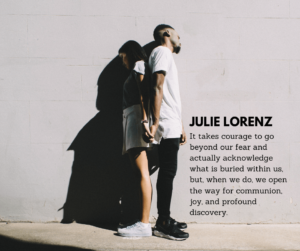Relationships & Marriages are Difficult
Committing to a relationship, whether it be as a couple or marriage, is not always an easy road. Julie Lorenz is a highly experienced relationship and marriage counsellor based in Melbourne, Australia. And now also available on Gold Coast.
Her down to earth and practical approach to relationships has helped many couples to bring back into focus their love, caring, commitment and intimacy with one another.
Julie helps couples overcome typical relationship stresses as well as more difficult issues such as infidelity, sexual dysfunctions, addictions, or fetishes.
Typical issues raised by couples that come to Julia for advice, support, and counselling include phrases such as:
- “My husband / wife is cheating…”
- “My wife / husband doesn’t want sex…”
- “Caught him looking at porn…”
- “My wife / husband wants to leave me…”
- “Fighting about the kids…”
- “Wife / husband won’t talk about issues…”
- “It just feels like we’ve grown apart…”
Sexual Conflicts Between Partners
Because we are evolving beings, our need, or lack of need, for sexual expression will flux and change. It may sometimes feel impossible for two people to remain harmonious in a mutual level of desire for any prolonged length of time. There is tremendous understanding available if we are able to listen deeply whenever a lack of harmony arises between us. We are gift bearers, bringing messages to ourselves and to one another through our sexual sharing. The ability to remain still enough to hear these messages requires tremendous discipline — the discipline of not complaining, of not blaming, of not fearing or doubting or judging. It is, in fact, the ultimate discipline of unconditional love and curiosity.

There are many reasons why two people are drawn sexually to one another. There is the need to be reassured, to reassure the other, to forget separateness, to be safe, to feel alive and vibrant, to be united, to feel in communion with, to ward off loneliness, to feel valued, to be momentarily complete, to do our duty, to transcend the daily boredom, to touch the mysterious, to awaken the life force, to be consumed by a power greater than the mind, to heal misunderstandings, to claim our territory, to reinstate our affectionate hold, to give what we believe the other wants, to keep peace, to express tenderness, and on and on and on. All the reasons are valid; all of them are part of a deep urge toward wholeness and love.
But each different reason carries with it a different energy field. Some of these fields are mutually compatible, and some are not. If, for example, we are longing to be reassured that we are loved and valued, and our partner is giving what he or she considers to be a duty, neither of us will be satisfied.
During times of disconnectedness, if we can intimately and with deep trust venture together into our most vulnerable honesties, we will begin to discover the understanding that can eventually lead to healing.
We have been given few attributes as potent, volatile, and complex as our sexuality. For our sexuality often becomes a focal point where unacknowledged fears, hopes, expectations, and griefs rise to the surface.
It takes courage to go beyond our fear and actually acknowledge what is buried within us, but, when we do, we open the way for communion, joy, and profound discovery.
The more we can share about ourselves with our beloved, the more sexual harmony we will enjoy, and the greater will be our ability to discover and heal all the fears and misconceptions that keep us from our true capacity for intimacy, pleasure, and fulfilment.
Julie’s approach to relationship and marriage counselling will help reduce conflict and create more awareness and intimacy between partners.
Intimacy and Humility
We have been socialised in this culture to believe in a romantic fantasy in which two people meet, fall in love, live happily ever after, and never need anyone else.
This, we all eventually discover, is merely a fairy tale, and seeking it distracts us from the possibility of a more fulfilling voyage of discovery, a voyage that can lead us deeper into ourselves and into each other.

Inevitably, we bring not only our love to a relationship, but also our wounds and confusion. As the relationship begins to mature, we become a bit more willing to let go of the image that we believed we needed to maintain in order to love or to be loved. We become willing to risk showing more of ourselves, more of those places where we believe we are flawed.
Healing relationships give us the courage to face ourselves, to see those attitudes and behaviours that are not in keeping with our essential being. They show us the ways in which we distance ourselves from others, and enable us to see how we defend those habits and beliefs that compromise our well-being and the well-being of our relationships. As we acknowledge and share these patterns, they can become undone. Conflict, guilt, sorrow, and all the other fearful emotions can lead us to the place where the wounded child waits in hiding, so that what has been hurt can be brought to health.
When our heart’s desire is to heal ourselves and each other, then every single moment can become an invitation to move toward love. When we open to ourselves and to our beloved with honour and total acceptance, something miraculous happens. In the full mingling of our spirits we are renewed, strengthened, and delivered to our highest possibilities. Our love has become a bridge not only to ourselves and to each other, but to life itself.
Achieving these goals is not always easy, and relationship and marriage counselling can help.
Criticism and Intimacy
There are times in every intimate relationship when we wish to express to the other person that he or she is doing something that we feel is not in alignment with his or her spirit.
This is a delicate moment. For when we share any kind of criticism, the attitude we hold toward the other and the manner in which we speak are an essential part of the message we convey. The communication becomes difficult to receive if we are relating out of a sense of separation or condescension, if we are bitter, judgmental, or angry, or if we are needing the other person to change. There is a much greater possibility that our communication will be heard and received when we are embracing the other as essentially well and whole, and when we speak with acceptance and respect for whom he or she already is.
We have all at times used our intimate relationships as a place to vent our frustrations. A healing relationship, however, calls for impeccable re spins ubiquity and infinite fairness and respect. For only then can enough trust develop so that trembling hearts can open deeply to each other and risk being known.
Contact us for expert relationship and marriage counselling in Melbourne and Gold Coast with Julie Lorenz on 0407 772 125
Emotional and physical intimacy
A couple’s intimacy can be measured by each individual’s ability to be emotionally and physically open, allowing themselves to be vulnerable and allowing the other to understand them on a deeper level.
In the beginning of intimate relationships, most people are eager to share their thoughts, feelings, beliefs, and physical connections with their new partner. Their relationship is exciting, and being open and vulnerable is fun. As time goes on, children are often added to the family system, while the demands of work and life become hectic. Partners/spouses tend to drift apart, typically losing their ability to connect emotionally, physically, sexually, and spiritually.
Emotional Intimacy and Physical Intimacy are intertwined.
In order to be emotionally intimate, each spouse needs a level of individual self-esteem and security, as well as a confidence and safety in being emotionally vulnerable with their spouse.For most people, emotional intimacy is not a skill that they learned in their family of origin or in their schooling experiences. Add that to any low self-worth, shyness, childhood traumas, past rejections, and failed relationships… and you have a formula for disaster.
The symptoms of marital problems are often intertwined with physical intimacy or sexual problems. The situation may include problems of performance, inhibited sexual drive, or infidelity. Partners often see the problems quite differently, and have in mind different solutions.
Working together with Julie during counselling sessions, barriers can be broken down, and issues overcome. Julie’s experienced approach will help provide you and your partner with the tools to improve your relationship and bring more intimacy into your marriage.
Intimacy Substitution
Often, intimacy is replaced by a substitute. The substitute can be of a sexual nature such as infidelity, pornography, phone sex, internet blogging, chronic masturbation, etc. The substitute can also be of a non-sexual nature such as psychological dependencies on the children, work, food, gambling, sports and exercise, shopping, pets, community activities, etc.
Most therapists look at these problems as a disease or addiction, and attempt to cure the problem with the individual alone. As an experienced Relationship Counsellor and Sexual Therapist , I believe that when an individual is satisfied in their life they do not need to substitute excessive, self-defeating, or unhealthy behaviours for the intimacy desired in their marriage.
Couples who report high levels of relationship satisfaction have both a healthy emotional connection and good physical/sexual relationship. At the root of their satisfaction lies the feelings of appreciation, desire and durability, acceptance, and unconditional love.

